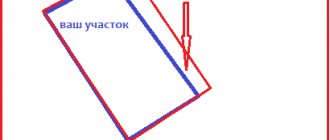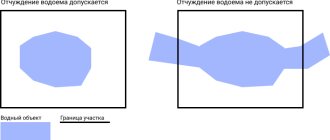The concept of "public lands"
“Public lands” mean lands (land plots) that are not owned by citizens and legal entities (private property). Conventionally, they can be divided into two groups:
- land plots not classified as property of the Russian Federation, constituent entities of the Russian Federation or municipalities, i.e. lands for which state ownership is not demarcated. It should be emphasized that the subject of ownership of such lands (which are currently the majority in the Russian Federation) has not yet been determined and until the delimitation of rights to them they are managed by authorities authorized by law;
- land plots classified as the property of the Russian Federation, constituent entities of the Russian Federation or municipalities, that is, lands for which state ownership is demarcated.
The Land Code of the Russian Federation dated October 25, 2001 No. 136-FZ (hereinafter referred to as the Land Code of the Russian Federation) contains an exhaustive list of grounds for acquiring property rights by public entities (Articles 17-19 of the Land Code of the Russian Federation): Russian Federation (federal property), constituent entities of the Russian Federation and municipal entities will be collectively referred to as “public entities”.
A. Land plots that are recognized by federal laws as the property of the relevant public entities.
For now, this basis applies only to federal property. Since 1992, a number of federal laws have been adopted, which in one form or another proclaimed federal ownership of land (for example, paragraph 10 of Article 1 of the Federal Law of May 31, 1996 “On Defense”). The Land Code of the Russian Federation also contains norms recognizing lands as federal property, in particular clause 4 of Art. 87 of the Land Code of the Russian Federation, according to which lands of industry and other special purposes occupied by federal energy systems, nuclear energy facilities, federal transport, communication routes, federal computer science and communications facilities, facilities supporting space activities, defense and security facilities, defense production facilities, objects that ensure the status and protection of the state border of the Russian Federation, other objects assigned to the jurisdiction of the Russian Federation in accordance with Art. 71 of the Constitution of the Russian Federation are federal property.
For the Russian Federation to have ownership of land, it is not enough to simply declare it in federal law. State registration of ownership of land plots is also necessary in the manner prescribed by the legislation on state registration of rights to real estate and transactions with it (Resolution of the Presidium of the Supreme Arbitration Court of the Russian Federation of April 5, 2005 N 12796/04).
B. Land plots, the ownership of which arose in public entities during the delimitation of state ownership of land.
The Land Code of the Russian Federation and other acts of land legislation issued in accordance with it provide for the division of state ownership of land into: property of the Russian Federation, property of constituent entities of the Russian Federation and property of municipalities. The legal basis and procedure for such a distinction are established by federal laws (clause 9, clause 1, article 1 of the Land Code of the Russian Federation). Federal Law “On the delimitation of state ownership of land”, the adoption of which is provided for in paragraphs. 9 clause 1 art. 1 and paragraph 2 of Art. 16 of the Land Code of the Russian Federation, was signed on July 17, 2001 and put into effect throughout Russia on January 20, 2002. The process of delimiting state ownership of the land of the above entities in accordance with the Decree of the Government of the Russian Federation of October 25, 2001 No. 745 “On approval of the Federal the target program “Creation of an automated system of state land cadastre and state registration of real estate” was supposed to be completed by 2008. However, according to the Ministry of Economic Development of Russia, it is estimated that if the existing pace of delimitation of state ownership of land is maintained, the process will be completed by 2023. Therefore The issue of simplifying and speeding up the delimitation procedure is currently being considered.
B. Land plots acquired by public entities on the grounds provided for by civil law.
Such grounds according to the Civil Code of the Russian Federation (Part 1) dated November 30, 1994 No. 51-FZ (hereinafter referred to as the Civil Code of the Russian Federation), in particular, are:
- contracts of purchase and sale, exchange, donation or other transaction on the alienation of property (Article 218 of the Civil Code of the Russian Federation);
- waiver of ownership rights (Article 236 of the Civil Code of the Russian Federation);
- requisition and confiscation of land plots from owners (Articles 242, 243 of the Civil Code of the Russian Federation);
- seizure of a land plot for state and municipal needs (Article 279 of the Civil Code of the Russian Federation);
- seizure of a land plot that is not used in accordance with its purpose or is used in violation of the law (Articles 284, 285 of the Civil Code of the Russian Federation).
Owners of land plots under civil law contracts usually become municipalities and constituent entities of the Russian Federation (for example, in order to exercise the pre-emptive right to purchase land plots from agricultural land).
The importance of dividing public lands into: demarcated and undemarcated is determined primarily by the fact that, depending on this circumstance, the authority authorized to manage them is determined. It is this authority that accepts applications from persons interested in providing land plots for construction, preliminary agrees on the location of the facility, provides land plots for construction, and also initiates the process of providing land plots for construction without prior approval of the location of the facility.
Public property entities
In domestic legislation, the state (as a public legal entity) is traditionally viewed as a special, independent subject of law along with legal entities and citizens. In this capacity, it can also act as a subject of ownership (owner) of land or a plot of land.
Features of the legal status of public property entities are:
- firstly, they have special powers (functions) that allow them to adopt normative acts regulating the procedure for exercising their property rights;
- secondly, the exercise of this right in the public (public) interests.
Public property in accordance with Russian legislation can be either state or municipal. The right of state property is characterized by a multiplicity of subjects, whose role is played by the Russian Federation as a whole (in relation to property constituting federal property) and its subjects - republics, territories, regions, etc. (in relation to property that constitutes their property).
The subjects of state property rights are state (public law) entities as a whole, that is, the Russian Federation and its constituent republics, territories, regions, etc., but not their authorities or management (clause 3 of Article 214 of the Civil Code ). The latter act in property transactions on behalf of the state entity and, in accordance with their competence, exercise certain powers of the public owner (Article 125 of the Civil Code).
Municipal property refers to public rather than private property, since its subjects are public legal entities. Municipal property is not a type of state property, but is an independent type of public property. However, as participants in property relations, municipalities acquire a special public legal status. Therefore, their position as owners is based on the model of state ownership.
Subjects of municipal property rights in accordance with paragraph 1 of Art. 215 of the Civil Code recognizes urban and rural settlements and other municipalities in general. On behalf of the municipal entity-owner, its powers, in accordance with their competence, can be exercised by one or another of its bodies (Article 125, paragraph 2 of Article 215 of the Civil Code of the Russian Federation), which does not, however, make them the owners of this property. Which state or municipal body has the right to act in certain specific property relations on behalf of the state or municipal entity is determined by the competence of this body established by law. Thus, when alienating certain state or municipal property into private ownership in the manner of privatization, on behalf of the alienator-owner in accordance with the legislation on the privatization of state and municipal enterprises, the relevant committees and property management funds act. For example, the acquisition or sale of state-owned historical and cultural monuments is carried out through the bodies protecting these monuments, which are the Ministry of Culture and its bodies. If we are talking about the property liability of state entities, then the bodies of the Ministry of Finance become defendants in the relevant claims in most cases. But in all of the above situations, the party to one or another specific legal relationship in the legal sense is the state or another public legal entity, and not its body.
Modern Russian legislation does not use the concept of “national property” (“inalienable property of peoples”) or similar ones in relation to federal or other state property. Previously, this concept was used primarily in relation to land and other natural resources (as well as some historical and cultural monuments). It could be interpreted as a special legal regime that excluded anyone (including the state) from ownership of the corresponding object. Now these resources are considered as “the basis of the life and activities of the peoples living in the corresponding territory,” which does not create any special civil law regime for these objects. So, this is recorded in particular in paragraph 1 of Art. 3 Land Code of the Russian Federation.
Who makes the decision
They manage real estate, including land plots in state or municipal ownership, by the relevant executive authorities or local governments. In some cases, public hearings must be held to make decisions about the future use of government-owned property.
It should be emphasized that persons responsible for abusing the right to dispose of state property may be subject to various types of liability, including criminal liability. Real estate objects owned by the state or municipalities are subject to mandatory registration with the Federal Service for State Registration, Cadastre and Cartography.
Division of land with a house for 2 owners.
Public ownership of land (property of public entities)
The content of property rights, which applies to any objects of civil rights, including land plots, is established by civil law. According to Art. 209 of the Civil Code of the Russian Federation, the owner has the rights to own, use and dispose of his property. In addition to the traditional list of powers established in relation to any owner (triad), the owner of public entities also has the authority to manage property. The Land Code of the Russian Federation contains 3 articles devoted to the regulation of property rights to public lands in Russia - Art. 17 “Property of the Russian Federation (federal property) of land”, Art. 18 “Land ownership of constituent entities of the Russian Federation”, Art. 19 “Municipal ownership of land.”
Author of the article
Flaws
There are also disadvantages to the public form of ownership:
- Working on state land, an individual or legal entity cannot dispose of it - sell, lease, change.
- If you violate the rules of use, for example, of an apartment, you can lose your home without replacement. This also applies to renting a plot of land.
If the property is the property of public legal entities, this means that it is owned by the state (municipality). The state can transfer its property to a private legal entity, but the transfer procedure is quite complicated and takes time.








